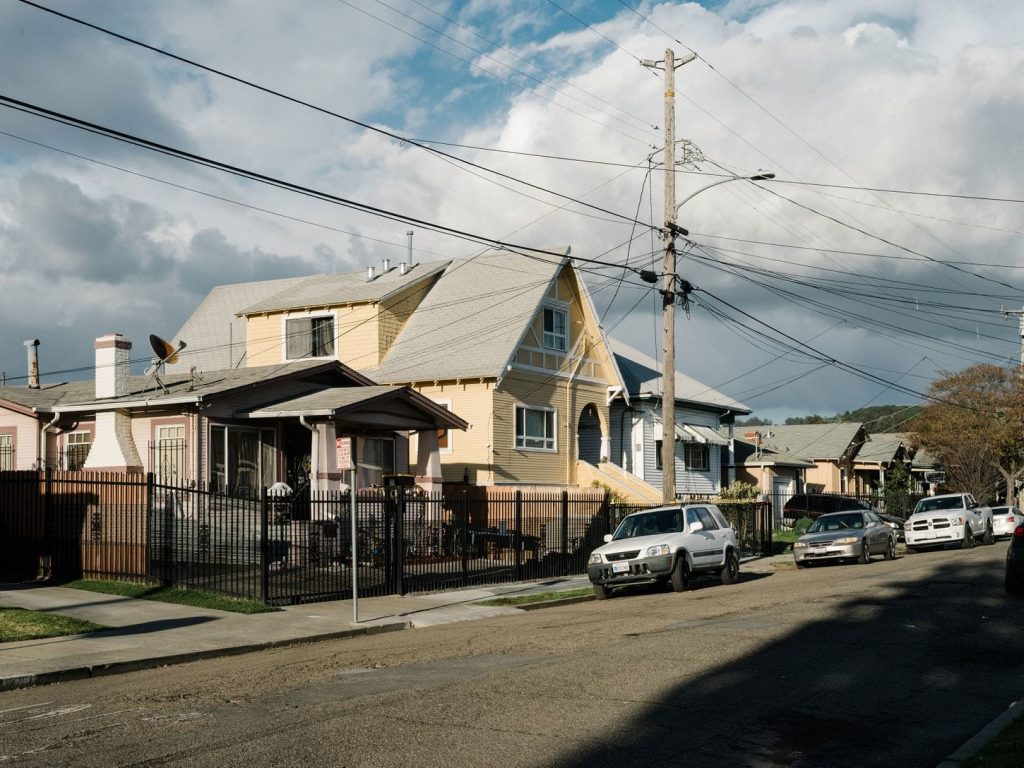The ‘heartbreaking’ decrease in black homeownership
By Troy McMullen
Racism and rollbacks in government policies are taking their toll.

Vanessa Bulnes and her husband, Richard, bought their house on 104th Avenue in East Oakland, Calif., in 1992.
The modest two-bedroom property is where they lived for 20 years, raising three children, and where Vanessa made a living running an in-home day-care center. Neighbors in the mostly African American community often saw her planting vegetables in the backyard, with her kids in tow.
After Richard had a stroke in 2008, reducing the couple to a single income, they fell behind on their mortgage and eventually lost their home to foreclosure. A years-long legal effort to refinance the loan on the property failed, and in 2012, the couple were forced to move into a nearby rental home, where they live today.
The Bulneses’ plight echoes one that plagued many American families in the wake of the housing collapse, when foreclosure rates soared. But black families were hit particularly hard, housing data show, forcing many out of their homes and pushing black homeownership rates to record lows.
On the Bulneses’ six-block street alone, at least 35 properties were foreclosed between January 2006 and December 2012, according to the Alliance of Californians for Community Empowerment (ACCE), an advocacy group for low-income communities of color.
“We thought the banks were in the business of helping people, but they really didn’t seem to care at all,’’ said Vanessa, 60, who is now active in her community helping others fend off foreclosure. “The whole thing was a very heartbreaking experience.”
In 2004, the pinnacle of homeownership in the United States, nearly half of all African American families owned a home, according to census data.
The record figure, fueled by the housing boom of the early 2000s, was still one-third less than housing rates for whites. But it was widely viewed as a milestone for a minority group that spent generations largely shut out of a fundamental pillar of the American Dream.
Yet, over the past decade, the real estate fortunes for African Americans have reversed course. Despite a strengthening economy, including record low unemployment and higher wages for black workers, homeownership levels for that group have dropped incrementally almost every year since 2004.
It fell to 43 percent in 2017, virtually erasing all of the gains made since the passage of the Fair Housing Act in 1968, landmark legislation outlawing housing discrimination.
The decline comes even as whites, Asian Americans and Latinos slowly see gains in home-buying, according to a report by Harvard University’s Joint Center for Housing Studies.
Nationally, 63.9 percent of Americans owned a home in 2017, the Harvard report shows. The white homeownership rate reached 72.9 percent, up from 72.2 percent a year earlier. The Hispanic homeownership rate reached 46.2 percent, up from 45.5 percent in 2016.
Researchers at the Urban Institute found large disparities between the homeownership rates of black families and white families in all 100 of the cities with the largest black populations, pushing the housing gap between the two groups to its highest in more than 50 years.
Although the gap between white and black homeowners in the District seems wide, the city actually has one of the smallest imbalances among U.S. cities — 71.8 percent for whites and 48.8 percent for blacks.
“We’ve made progress in leveling the playing field for minority homeownership, but the landscape is still more challenging for African Americans,” said Chris Herbert, managing director at the Joint Center for Housing Studies.
Role of discrimination
The reasons for the downturn in the black homeownership rate are varied and complex, experts say. They include a lack of affordable housing in some areas and chronically low inventory in others. Rising student debt is increasingly an issue, too, as more financially strapped buyers struggle to save for a down payment.
All home buyers face these hurdles, but they disproportionately affect African Americans, said Jessica Lautz, director of demographics and behavioral insights at the National Association of Realtors (NAR). “Half of all African Americans to the market are first-time buyers,” Lautz said. “So grappling with student debt and affordability issues generates a much greater barrier to homeownership.”
Discrimination is also playing a role, said Lisa Rice, president and chief executive of the National Fair Housing Alliance (NFHA).
A study by the group found that real estate discrimination was pervasive in at least a dozen major metropolitan areas, including the District.
African American testers posing as home buyers were often denied information about special incentives that would have made the purchase easier, and were required to produce loan pre-approval letters and other documents when whites were not. The alliance also settled a federal fair housing complaint in 2017 alleging that real estate agents in Jackson, Miss., were discriminating against black clients and steering people away from high-value areas and into segregated communities based on race.
“When buyers of color face discrimination in the marketplace, it can discourage them from the whole process,” said Rice, who estimates that a quarter of all African Americans experience some level of bias in housing.
Securing a mortgage is also more challenging for African Americans, data show.
In 2017, 19.3 percent of black applicants were denied a conventional home loan, compared with 7.9 percent for whites, according to the federal Consumer Financial Protection Bureau. The refinancing market saw similar differentials with blacks rejected on 39 percent of their applications and whites on 22.9 percent.
Lenders insist the gap reflects wealth disparities among racial groups, with minorities generally having lower credit scores and less cash for down payments. But Antoine Thompson, executive director of the National Association of Real Estate Brokers (NAREB), the oldest black real estate trade association in the country, said the disparity reflects historical and structural problems.
“In some cases, even when blacks have higher credit scores, they were often offered worse financing terms than less-qualified whites,” he said. “So it’s hard to argue that bias isn’t a factor.”
By the numbers Since 2001, the African American homeownership rate has declined 5 percent compared with a 1 percent decline for white families and increases for Hispanic families. Source: Urban Institute
The homeownership rate of black millennials stands at 13 percent compared to 37 percent for white millennials. Source: Urban Institute
About 240,020 African Americans lost their homes to foreclosure between 2005 and 2008. Source: The Center for Responsible Lending.
The median wealth of white households in 2016 ($162,800) was ten times higher than that of black households ($16,300) and eight times higher than that of Hispanic households ($21,400).
Source: Harvard’s Joint Center for Housing Studies.
Historian Richard Rothstein, a housing policy expert at the Economic Policy Institute, said that even though fair housing advocates should be applauded for policing discrimination, a stronger government response is needed to blunt decades of discriminatory housing policies.
“It’s no surprise that black families are still experiencing some level of discrimination,” Rothstein said. “Because of the long-term effects of racially explicit government housing policies, where for decades blacks were excluded from buying homes in some areas, we need equally explicit government policies to remedy the imbalance,” he add. “There is no way this can be fixed by market forces alone.”
Leonte Benton, 34, said having a strong understanding of the home-buying process helped when he purchased his four-bedroom home in South Fulton, Ga., in January. A commercial real estate broker, Benton said he fully understood the challenges of securing a loan and having enough saved for a down payment well before his home search began. He also sought out broker Jeffrey Hicks, of Apollo Associates Realty in Atlanta, after learning that he specialized in helping African Americans build wealth through homeownership.
“People can underestimate what’s needed to actually buy a home,” said Benton, who moved into the property with his wife and their 1-year-old child. The couple have another baby on the way. “So I can see where families can come up short in the process, but being fully prepared made all the difference for us.”
Undoing anti-bias policies
The Department of Housing and Urban Development is facing criticism for undoing Obama-era fair-housing policies.
HUD suspended a 2015 rule requiring communities receiving billions in federal aid to draft plans to desegregate their communities or risk losing federal funds. It’s also withdrawing a computer assessment tool that provides communities with data to help gauge neighborhood segregation and better comply with fair housing provisions.
HUD says that the tool “was confusing, difficult to use and frequently produced unacceptable assessments.”
“We believe in furthering fair housing choice in our neighborhoods, but we have to help, not hinder, those who have to put our rules into practice,” Anna Maria Farías, HUD’s assistant secretary for fair housing and equal opportunity, said in a statement. “We must make certain that our tools can facilitate the goals we all share — to build inclusive and sustainable communities free from discrimination.”
The agency says it is also seeking public input on how local governments can best promote fair housing choices.
But fair-housing advocates say the reversals allows HUD to suspend communities’ obligation to fix residential segregation.
“They’re making rules meant to police fair housing essentially null and void,” said Lisa Rice of the NFHA.
Alanna McCargo, co-director of the Urban Institute’s Housing Finance Policy Center, said the biggest factor hurting black real estate prospects is the lingering effects of the financial crisis.
Enticed by relaxed lending policies and plenty of affordable housing, African Americans purchased homes in record numbers at the peak of the housing bubble. But when the market collapsed — bringing the economy to its knees a decade ago — the foreclosure crisis that followed hit African Americans particularly hard.
About 8 percent of black homeowners lost their homes to foreclosure from 2007 to 2009, according to the Center for Responsible Lending. That’s almost twice the rate for white homeowners.
High-income black households were also targeted with risky subprime loans at the height of the housing boom, research shows.
In 2006, amid the real estate run-up, black families earning more than $200,000 annually were more likely on average to be given a subprime loan than a white family making $30,000 a year, according to research by Jacob William Faber, a sociologist at New York University who studies racial economic disparity. Analyzing nearly 4 million loan applications nationwide, Faber found that blacks were more than twice as likely to receive a subprime loan than white applicants.
“The financial crisis triggered a massive destruction of wealth for African Americans,” said McCargo, who pointed to Federal Reserve data showing the median net worth of white families today at nearly 10 times that of black families. “Wealth is inextricably linked to housing, and that wealth gap is evident in figures for black-owned property in this country.”
McCargo said there is no silver bullet for fixing the housing imbalance, but she recommends stronger consumer protections to police unscrupulous lenders, more flexible or alternative credit models for greater access to mortgages, and expanding down payment assistance programs at the state and local levels. She also favors better financial counseling for new homeowners.
Marcus Williams and Iykeryia Smith said financial counseling was key to securing the purchase of their home in North Houston in November.
The couple found their newly built, four-bedroom property through broker Sherrie Jackson, owner of Umbrella Realty. Jackson is a member of the NAREB, which launched a program to produce 2 million new black homeowners across the country in the next five years through programs aimed at better educating home buyers.
“Sherrie paid attention to every detail of the process, from finding a lender to budgeting for the down payment,” said Smith, 33, who runs a travel agency with her husband. “It was a real educational process.”
“This isn’t just about making a sale,” said Jackson, who leads financial literacy workshops for African American first-time buyers. “We’re building a process where black homeownership will not only be possible, but actually flourish.”
Authors: Troy McCullen
Source: The Washington Post
The post The ‘heartbreaking’ decrease in black homeownership appeared first on National Association of Real Estate Brokers.


